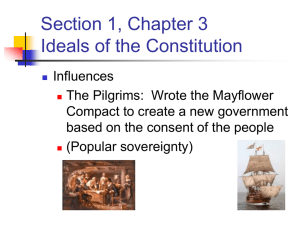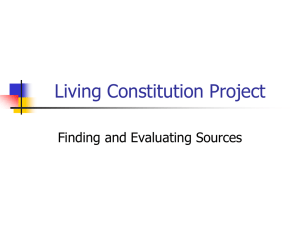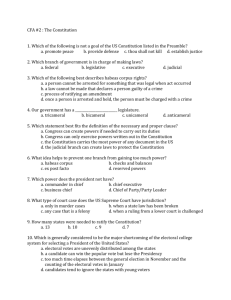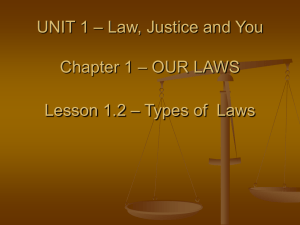The Constitution of the Republic of Kazakhstan. Constitutions posed
advertisement
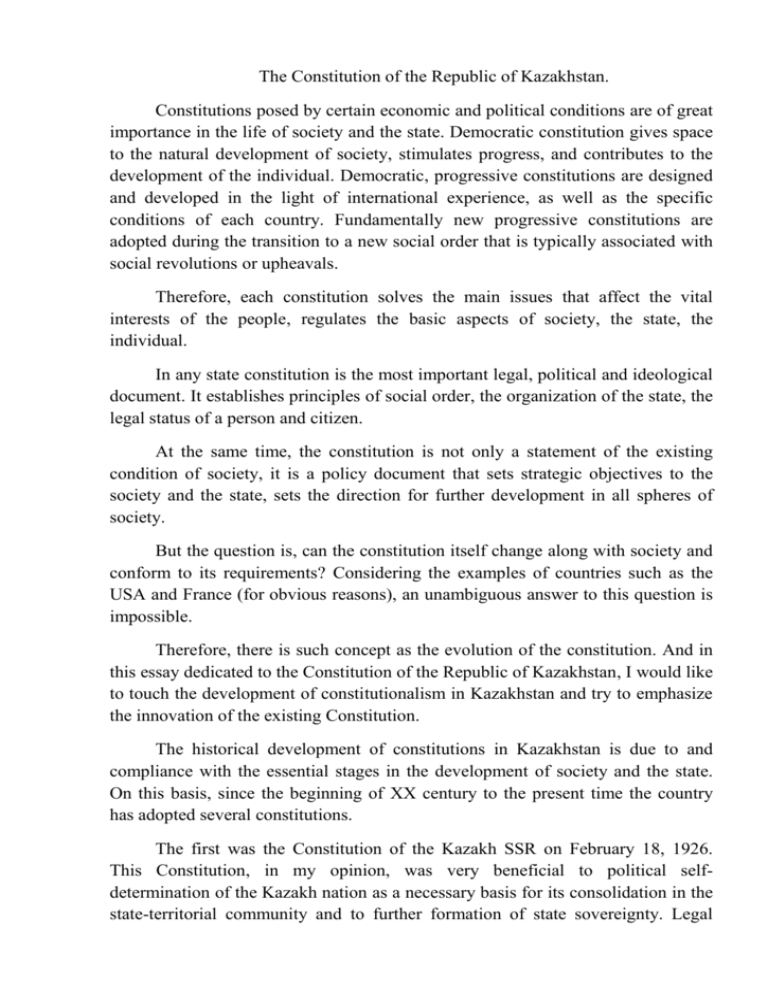
The Constitution of the Republic of Kazakhstan. Constitutions posed by certain economic and political conditions are of great importance in the life of society and the state. Democratic constitution gives space to the natural development of society, stimulates progress, and contributes to the development of the individual. Democratic, progressive constitutions are designed and developed in the light of international experience, as well as the specific conditions of each country. Fundamentally new progressive constitutions are adopted during the transition to a new social order that is typically associated with social revolutions or upheavals. Therefore, each constitution solves the main issues that affect the vital interests of the people, regulates the basic aspects of society, the state, the individual. In any state constitution is the most important legal, political and ideological document. It establishes principles of social order, the organization of the state, the legal status of a person and citizen. At the same time, the constitution is not only a statement of the existing condition of society, it is a policy document that sets strategic objectives to the society and the state, sets the direction for further development in all spheres of society. But the question is, can the constitution itself change along with society and conform to its requirements? Considering the examples of countries such as the USA and France (for obvious reasons), an unambiguous answer to this question is impossible. Therefore, there is such concept as the evolution of the constitution. And in this essay dedicated to the Constitution of the Republic of Kazakhstan, I would like to touch the development of constitutionalism in Kazakhstan and try to emphasize the innovation of the existing Constitution. The historical development of constitutions in Kazakhstan is due to and compliance with the essential stages in the development of society and the state. On this basis, since the beginning of XX century to the present time the country has adopted several constitutions. The first was the Constitution of the Kazakh SSR on February 18, 1926. This Constitution, in my opinion, was very beneficial to political selfdetermination of the Kazakh nation as a necessary basis for its consolidation in the state-territorial community and to further formation of state sovereignty. Legal features evolved and manifested in the activities of the supreme bodies of state authority and administration, particularly in the possibility to legislate on the territory of Kazakhstan. Finally, the country carried out inter-state direct external contacts within the Soviet Union. Further constitutional evolution of Kazakhstan can be called the period of the Kazakh Soviet republican state within the Soviet Union, when he had got elevated status of direct subjects of the Soviet Federation and the Constitutions of the Kazakh Soviet Socialist Republic in 1937 and 1978, and developed formal legally, as a sovereign state. From 1990 to 1993 in the history of the republic there were events of great political importance, which were inseparable connected with the collapse of the Soviet Union. Exactly this circumstance put on the agenda the question of the formation of a new state that is different from what it was in the past, the question of creation of a new sovereign, democratic, unitary state. For Kazakhstan, the creation of a new constitution under conditions of independence was a matter of special importance. October 25, 1990 the Supreme Soviet of the Kazakh Soviet Socialist Republic adopted the "Declaration of State Sovereignty of the Kazakh Soviet Socialist Republic", and in historical terms the constitution has always been made on the basis of the declaration. During this short period there have been truly global changes that have led to fundamental changes in all spheres of life. Before the adoption of the 1993 Constitution, the Supreme Council adopted a number of basic legal acts, such as the laws on property, citizenship, public associations, the Cabinet of Ministers, etc. All by 1992, were adopted more than 450 documents. All of them were the key factors for the development of the Constitution. The equality of all forms of ownership was legally recognized, a legal framework for decentralization and privatization, for various forms of business and market relations was created. During these years, beginnings of multiparty system - an essential element of a democratic civil society- appeared. There was changed the nature of relations between the individual, society and state, whose main task was to protect human rights. January 28, 1993 at the ninth session of the Supreme Council of the Republic of Kazakhstan was adopted the fourth constitution of the country. This constitution reflected the actual prevailing social relations of transition to a presidential form of government. However, the objective course of development has led to a significant adjustment of constitutional law. August 30, 1995 by popular vote the fifth Constitution was adopted. For the first time in the history Kazakhstan the people also received basic law of the state and society, constitutionally fixing a presidential republic with a single state authority, epitomized by the people. The need for the development and adoption of the new Constitution in Kazakhstan, to my mind, was objectively determined by two groups of reasons. The first group is made of fundamental changes in the life of Kazakhstani society that occurred in the late 80's - early 90's. 1) During the 1990-1995 multi-party political system is established. This led to the approval of a wide network of political parties and social movements. 2) Planned economy, based on the monopoly of state-owned and over-centralized public administration, has been actively replaced by market economic relations. 3) The characteristic for the Soviet period domination of one public official ideology (communist world) gave way to ideological and religious pluralism, on the basis of which was approved the freedom of thought and speech, was developed publicity. The second group of reasons is fundamental changes in the international situation of the country. 1) Proclamation of Kazakhstan as a sovereign and independent state has led to the fact that he had received a membership in international organizations. 2) The most important part of foreign policy was the participation in the Commonwealth of Independent States. 3) Kazakhstan, actively engaging in a modern international life, officially declared its commitment to the principles of international law and recognized principles and norms of international law and international treaties as integral part of its legal system. The Constitution of the Republic of Kazakhstan in 1995 is a totally new political-legal document. Its essential novelty is primarily manifested in the principles that crucially determine the content and form of all its institutions. As for me the basic ideas here are the following: democracy and popular sovereignty, which implies a separation of powers; constitutionalism and the rule of law; natural and inalienable rights of man and citizen; promotion of peace among peoples and nations, respect for the principles and norms of international law; public consent and political stability; resolution of the most important issues of state by democratic methods including voting in the national referendum or in the Parliament. The apparent novelty lies in provisions, which determine the constitutional status of the individual: the natural rights of man, a complete legal equality of all citizens regardless of their origin, social or property status, race, sex, nationality, language, religion, beliefs, place of residence or any other circumstances. Another novelty consists in established rule according to which a citizen of the republic under no circumstances can be deprived of citizenship, the right to change his nationality and cannot be exiled from Kazakhstan. An innovation is the recognition of the Constitution to protect private property, that presupposes the protection of intellectual property. A new step forward makes the Constitution on the issue of redistribution of constitutional powers between the President, Parliament, Government and the courts. In fact, in Kazakhstan in recent years there has been a transition from the parliamentary, and then mixed parliamentary-presidential system to a presidential one. This is clearly demonstrated by the fact that the 1993 Constitution and the Constitution of 1995 give the Parliament less authority than the Supreme Council had according to 1978 Constitution. Considering to the opinions of many lawyers and political scientists, I will allow myself to assume, that the Constitution of Kazakhstan of 1995 is fully consistent with the generally recognized principles and norms of international law, European and international standards of constitutional lawmaking, not only on the experience of the constitutional development of advanced democracies, but also takes into account the current practice of legislative regulation public relations in Kazakhstan at present. In my opinion, in contrast to the previously existing, the Constitution of 1995 reflects the actual situation in the country and the real needs of the socio-economic, socio-political, spiritual and moral development of society. The central idea of the Basic Law is to ensure consent and compromise between various social and political forces of Kazakhstan's society, both the near and the more distant historical perspective. This makes the Constitution the most important factor of political stability, the guarantor of civil peace, social and national reconciliation. In conclusion I would like to say that the Constitution and formulated in it the principles of political and legal institutions promote the incorporation of our society and the state in world economy, world politics and generally in the progress of modern civilization.





